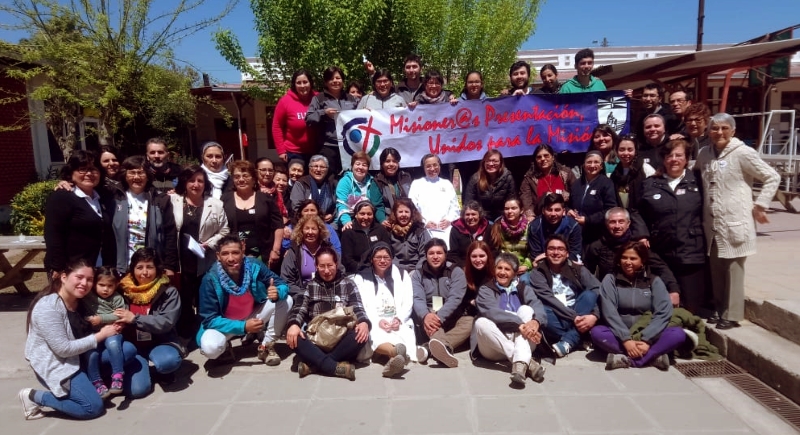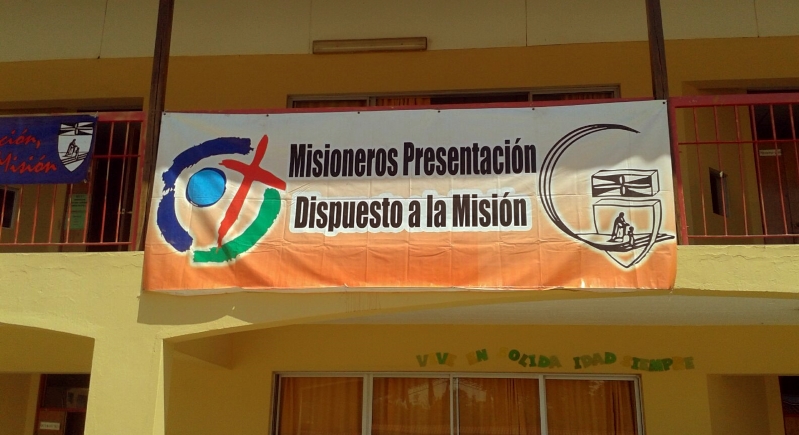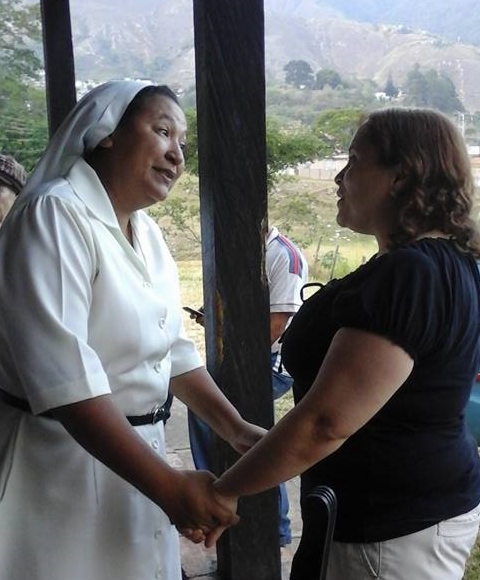 From Bogota
From Bogota
The 56th General Chapter 2024, insists on the commitment to network with the laity and different organizations, drawing on the resources and experience of others, to provide effective responses.
The Commitment to Walk Together
“If anyone has ears to hear, let them hear and understand” (cf. Mk 4:9)
Let us affectionately recall the reflections we already know in writing, to commit ourselves, pray, and translate them into daily actions of transformation.
In the precious company and words of our Foundress:
- “Frequently renew the intention of doing everything for the glory of God” (RG).
- “They will conduct in their houses, for those more advanced in age, readings and familiar conferences on the things necessary for salvation, and they will welcome in their House those who wish to make retreats. They will omit nothing to form people who, after them, may perpetuate those good works in the places where they are established and extend them wherever they may be called by legitimate authority” (R I).
- “The community will not confine within itself the gifts it has received from heaven; it will act in such a way that it may generously and abundantly spread them around” (R XXXVII).
What vision and wisdom from the past, still so current and relevant today... a call and a challenge for every daughter of Marie Poussepin! Synodality—though Marie Poussepin did not use this word—is part of the identity and charism of the Congregation: walking together, in listening, encounter, care, discernment, and celebration (IVC 2019–2023, p. 70).
The laity are simply the vast majority of the People of God. The ordained ministers are at their service” (Evangelii Gaudium, 102).
Pope Francis reminded us that “the need to value the laity does not depend on any theological novelty, but is based on ‘a proper understanding of the Church,’ as the People of God, of which the laity are a full part along with the ordained ministers.” Synodality finds its source and ultimate purpose in mission: it is born of mission and directed toward mission... it awakens in all the desire to walk together (Synod on Synodality 2024 – Final Document).
Speaking of collaboration and participation with "others"—be they congregations, religions, lay people—means opening ourselves to the understanding that charisms are gifts for the Church, that we must share the faith to be enriched, to live the Spirit, and to witness that everyone is responsible for proclaiming the Kingdom of God. This requires a change of mindset to place ourselves on equal footing with others, so that we may carry out the Church’s mission—and we will not fear exploring new paths offered to us in shared mission with other congregations or with the laity… (cf. IVC 2019–2023, p. 88).
Where are we now? What paths should we follow?
 Annual Assembly 2025 of Bogotá
Annual Assembly 2025 of Bogotá
In the 56th General Chapter:
- In the section “Together to transform our life and mission,” it declares as the second priority for the whole Congregation: “To embrace synodality as a lifestyle and as a permanent opportunity to ‘walk together,’ in communities open to dialogue, listening, discernment, and participation, with respect for differences, where ‘conversation in the Spirit’ is a way of encountering one another and others” (p. 20).
- And in “Updating our Charism of Charity,” responding to new forms of poverty: “To work in networks with lay people and different organizations, making use of available resources and learning from others’ experiences, to provide effective responses” (p. 26).
- With regard to other decisions, one topic addressed in the revision of the Constitutions is: The place of lay people in economic councils, secretariats, treasuries, and archives of the provinces and at the general level (p. 37).
Today, the task given to us through the key word “synodality,” offered by the Church since 2021, is the path to follow; a challenge that calls for concrete and transformative actions in daily life and in every context—small spaces where we open doors and make the experience of synodality real. One such space is conversation in the Spirit, for only the Spirit can lead us into a true change of mindset and openness to diversity as something possible.
What other windows and doors can—and will—we open?
Text: Sr. Pastora Marín Vásquez
Sisters and Laity, from the beginning, one single community...
 From ChileFrom the origin of our Congregation, Marie Poussepin understood that the mission of the community would be carried out by sisters and lay people together.
From ChileFrom the origin of our Congregation, Marie Poussepin understood that the mission of the community would be carried out by sisters and lay people together.
When she sends Miss Angelica together with a sister to one of her first foundations, she paves a way for the Congregation that seeks to journey along with the people with whom she shares life; for Marie Poussepin the relationship between laity and sisters is not a simple task, but a constant effort to consider themselves as equals that is to say that laity do not "support" the sisters, but walk with them, search together and share life, as is the experience of the first communities.
Today, more than ever we are invited to live a synodal path in the different connections that are woven within the ecclesial experience as well as in the Congregation.

A Church that defines itself on a journey with others, in the style of Jesus of Nazareth himself who, in order to carry out his mission, calls and forms a group of men and women who, walking together (among themselves) and together with the Master, formed the first communities that gave witness to the experience with Jesus. Our Charism is not reduced only to the lived experience that each sister undergoes personally or in community, but it is enriched by the presence of men and women of faith, who, from their baptismal commitment, also embrace as their own the richness of the legacy of charity received from Marie Poussepin.
- "Being part of the lay associate of the Presentation is meaningful when this membership is assumed from Charity understood as surrender in Love. From there, love itself allows to recognize ourselves as unique persons who share that Love. Rather than seeing it as an association with a different label, I see it as tearing down the tags and recognizing ourselves as parts of the same body, where each person fulfills a function in the construction of a society where Love reigns".
- "It is to assume a commitment and co-responsibility from my position with my brothers and sisters in this beautiful project that is the Kingdom of God."
- "It is to accept a unique role and lifestyle that is born of charity, preaching, study, service and mission.”
- “To be a woman lay associate today, is to live with my feet firmly on the ground so that personal and social realities such as the pandemic, family difficulties, social and ecclesial environment do not prevent to serve with simplicity in the style of Jesus and Marie Poussepin, very united with people, especially those who think differently, because in unity we can find the truth.”[1]
The Church today requires us to return to the origin, to the origin of Jesus and the origin of our Congregation, to fill ourselves with original vision again, in a community that seeks truth in communion with all our brothers and sisters.
Text: Srs. Gabriela Vergara Ríos and Licarayén Torres Miñoz (Aconcagua)
_______[1] Several lay people from the Vice-Province of Aconcagua responded to the question "What does it mean to be a lay associate of the Presentation today?
In the mission of the Congregation
Many of the persons with whom we work are lay Christians and participate in one way or another in the mission of the Congregation. We are happy to recognize the action of the spirit which has awakened in them diverse ways of sharing our Charism: Students, volunteers, lay groups, Presentation groups of laity, Dominican missionaries, fraternities, collaborators, and associates, among others. From all of them we receive their richness, questionings and talents. From Venezuela
From Venezuela
In our multicultural world, sharing and solidarity is necessary to construct a more just and fraternal society more in accord with what God wants for humanity. It depends on all of us, Christians or not, believers or not, in the daily sharing of life as in the projects of great significance. Civil society offers us through its governmental and nongovernmental organizations, (NGO) opportunities to form alliances to unite our strengths with those who share our concerns and values. The accompaniment of persons and marginalized groups and the ecological concerns could be areas for common actions.
“The journey that we have been making with others, within or outside the Church, in the Dominican Family, with the laity and finally with all those who in the present society desire to contribute to construct a more just, human and fraternal world and to work for peace.”


 EN
EN  ES
ES  FR
FR 



